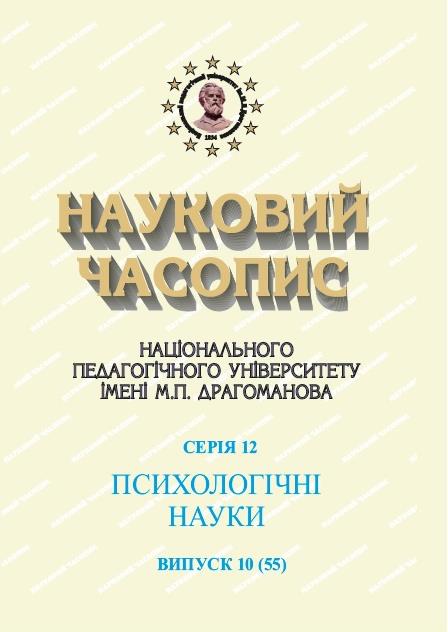PECULIARITIES OF VALUE-SEMANTIC SPHERE OF MILITARY WITH DIFFERENT EXPERIENCE PARTICIPATION IN COMBAT ACTIONS
DOI:
https://doi.org/10.31392/NPU-nc.series12.2020.10(55).03Keywords:
value-semantic sphere, values, meanings, military sphere, military activity, meaning of life, Joint Forces OperationAbstract
In the present article, the substantiation of actuality and appropriability of research of the value-semantic sphere of military personal is provided. The main aim of the present study is the research on the impact of combat experience on the value-semantic sphere of military personal. The main modern psychology approaches to addressing the problem of the personality value-semantic sphere are analyzed, in particular, the changes of the value-semantic sphere as a result of professional duties in the field of military activity. The specificity of combat activity which is connected to life-threatening situations and risk-taking may lead to changes in life values. Therefore, the assumption was made of the destructive influence of the experience of participation in hostilities on the value-semantic sphere of the military. The results of conducted research of life orientations of military personal (the core component of the value-semantic sphere) are presented; comparative analyzes of life orientations of study participants with a different experience of being in the area of the Joint Forces Operation is conducted. The results of the study show no statistically significant differences among life orientations of groups of military personal with and without the combat experience in the Joint Forces Operation, yet they have some specifics. Among the military personal with combat experience, a significantly larger number of people are satisfied with their lives and are able to control it depending on certain circumstances. The negative influence of chronological (ontogenetic) age of the subjects, who have experience of being in Joint Forces Operation, on the quality and indicators of their meaningful life orientations was revealed. The life orientations of combatants are, in general, more differentiated in their significance and meaningfulness than those of weren’t in Joint Forces Operation military personnel. Significantly more respondents with combat experience, compared to those who do not have it, exhibit a polarity in the comprehension of life values: they think very deeply about their meaningful life orientations or lose meaning in them.
References
- Anan'ev, B.G. (2016). Chelovek kak predmet poznanija [Human as a subject of knowledge]. (3rd ed.). Sankt-Peterburg : Piter [in Russian].
- Vasiljuk, F.E. (1984). Psihologija perezhivanija (analiz preodolenija kriticheskih situacij) [Psychology of experience (analysis of overcoming critical situations)]. Moskva : Izd-vo Mosk. un-ta [in Russian].
- Vyhovskyi, S.E. (2012). Teoretyko-metodolohichni pidkhody do vyvchennia smyslovoi sfery osobystosti [Theoretical and methodological approaches to the study of the semantic sphere of personality]. Nauka i osvita – Science and education, 6, 240-243 [in Ukrainian].
- Vygotskij, L.S. (2005). Psihologija razvitija cheloveka [Psychology of human development]. Moskva : Smysl [in Russian].
- Zhuravlova, L.P., & Matiushenko, T.A. (2009). Vplyv empatii na rozvytok tsinnisno-smyslovoi sfery starshoklasnykiv z riznoiu profesiinoiu spriamovanistiu [Influence of empathy on the development of value-meaning sphere of high school students with different professional orientation]. Nauka i osvita – Science and education, 6, 197-201 [in Ukrainian].
- Zhuravlova, L.P., & Muzhanova, N.V. (2019). Dynamika tsinnisno-smyslovoi sfery uchasnykiv subkultur [Dynamics of value-semantic sphere of participants of subcultures]. Psykholohiia: realnist i perspektyvy: zb. nauk. prats – Psychology: Reality and Perspectives: Coll. of sciences. papers, 12, 66-71 [in Ukrainian].
- Leont'ev, D.A. (2007). Psihologija smysla: priroda, stroenie i dinamika smyslovoj real'nosti [Psychology of meaning: nature, structure and dynamics of semantic reality]. (3rd ed.). Moskva : Smysl [in Russian].
- Leont'ev, D.A. (2000). Test smyslozhiznennyh orientacij (SZhO) [Life Orientation Test (LSS)]. (2nd ed.). Moskva : Smysl [in Russian].
- Rubinshtejn, S.L. (2012). Bytie i soznanie [Being and consciousness]. Sankt-Peterburh: Piter [in Russian].
- Yahupov, V.V. (2004). Viiskova psykholohiia [Military Psychology]. Kуiv : Tandem [in Ukrainian].
- Atkinson,M. (2003). The Civilizing of Resistance: Straightedge Tattooing. Deviant Behavior, 24(3), 197-220.
- Dixon,N. (2012). On the Psychology of Military Incompetence. [Electronic resource]. Retrieved from http://combatreform.-org/militaryincompetence.html/
- Frankl, V. (2004). Man's Search for Meaning: The classic tribute to hope from the Holocaust. London. Sydney. Auckland. Johannesburg : Rider.
- Freud, (2013). Reflections on war and death. [Electronic resource]. Retrieved from http://www.sophiaproject.org/uploads/1/3/9/5/
13955288/freud_waranddeath/pdf - Hogg, (2003). «Social Identity: Sociological and Social Psychological Perspectives». Social Psychology Quarterly, 66(1), 97-100.
- Lawrence, (2017). Emotional and Psychological Trauma. [Electronic resource]. Retrieved from https://www.helpguide.org/articles/ptsd-trauma/copingwith-emotional-and-psychological-trauma.html
- Murray, (2002). Armed conflict as a public health problem. BMJ, 324, 346-349.
- Parks,, & Guay, R. (2009). Personality, values, and motivation. Personality and Individual Differences, 47, 675-684.
- Parks-Leduc, (2014). Personality traits and personal values: a meta-analysis. Personality and Social Psychology Review, 1(3), 21-33. https://doi.org/10.1177/1088868314538548
- Thomas, (2006). The Unequal Burden of War: The Effect of Armed Conflict on the Gender Gap in Life Expectancy. International Organization, 60(3), 723-754.

